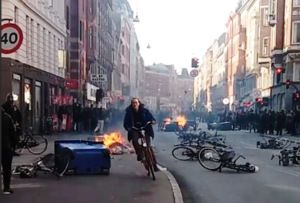News
Red-light rats: Danish police fine scores of cyclists thanks to tip-offs from the public
This article is more than 2 years old.
Officers thank snitches for all their hard work

This surely has to be the largest fine imaginable (photo: archive)
In some European countries, it’s the public vs the police. Citizens in countries like the UK and Italy might disapprove of certain driving offences and antisocial behaviour, but they would never grass/snitch on the culprits.
Motorists flash their lights to warn each other about the presence of a concealed speed trap; pub-goers exchange information about the police car they saw parked around the corner on the lookout for potential drink-drivers.
But not in Denmark, where the police take pride in their close collaboration with the public. Just this Wednesday (March 29), they announced a highly profitable morning fining cyclists – and it was all thanks to tip-offs from the public!
Lying in wait
Thanks to suggestions from the public, police officers set up hidden patrols at several locations around Copenhagen where cyclists are known to jump red lights.
There are a few junctions on Amagerbrogade, the road that takes cyclists through Christianshavn to the city centre, where many choose not to wait at the red lights.
The same was true at selected junctions around Nørreport and Frederiksberg Center, and also on Nørrebrogade, Rådhusstræde, Østerbrogade, and Vesterbrogade where it meets HC Andersens Boulevard.
The latter is a right-hand turn through a red light and major pedestrian crossing (11 fines in total), so the police were not just concerned with junctions where cyclists might jump red lights and be hit by cars.
Fines and lectures
In total, they handed out 100 fines of 1,000 kroner each. Amagerbrogade in Christianshavn yielded the most with 24, followed by the Lygten/Frederikssundsvej junction with 14.
Additionally, fines were given to seven cyclists for using hand-held mobile phones, and several others were punished for cycling on the pavement. The police used their own bikes, at times, to intercept offenders.
“We have selected some specific places where many cyclists run red lights, and also places where citizens have reported to us that they are not driving according to the rules,” a triumphant Bjarke Alberts, the head of the local police force in Amager, told København Liv.
“We had a good chat with a lot of citizens, where we explained, among other things, why it is so important to comply with the traffic laws – also on bicycles. Dangerous situations or, in the worst case, outright accidents can arise very quickly.”










































